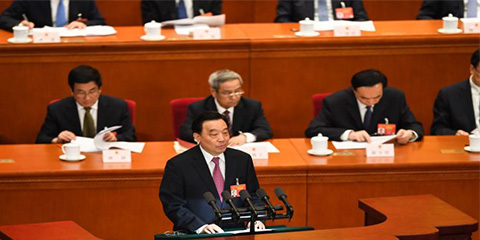New foreign investment law to safeguard China’s opening up
2019-03-14 1137
Note: The following article is taken from the Chinese-language "Commentaries on International Affairs."
Airbus recently announced that its innovation center in Asia has opened in the city of Shenzhen. The company expects to take advantage of local innovative talent, technology, and the availability of local partners to further enhance its capacity for innovation, and in doing so shape the future of flight.
This move is a footnote to the new round of high-level opening-up that started in China in 2018. Foreign investment in China rose by 3 percent last year, despite the 19 percent decline in global cross-border investments. And China’s upward trajectory has continued into this year: the actual use of foreign capital rose by 4.8 percent in January over the same period last year, and investment from the United States and the Netherlands grew by 124.6 percent and 95.6 percent respectively, according to the latest figures from the Ministry of Commerce.
Another case in point that shows China's determination for its continued opening up and high-quality development is the draft foreign investment law currently being deliberated by the National People's Congress. It is an attempt to promote foreign investment, protect the rights and interests of foreign investors, and create a favorable business environment.

Wang Chen, vice chairman of the National People's Congress (NPC) Standing Committee, makes an explanation on the draft foreign investment law during a meeting of the NPC in Beijing, March 8, 2019. [Photo: AFP]
In the early days of reform and opening up, China adopted three laws on foreign investment, namely the Chinese-Foreign Equity Joint Ventures Law, the Wholly Foreign-Owned Enterprises Law and the Chinese-Foreign Contractual Joint Ventures Law, to provide norms and legal guarantees for foreign investors. Over the past 40 years, foreign businesses have set up 950,000 enterprises in China in accordance with these laws, with investments totalling more than 2 trillion U.S. dollars. They have played an important role in promoting the sustainable development of China's economy, expanding foreign trade, optimizing the country’s industrial structure, increasing employment, and perfecting market mechanisms.
Deepening reform was made one of the four pillars of China’s development strategy better known as the “four comprehensives” five years ago. Its objectives include improving its open economic system, perfecting laws and regulations related to foreign entities, and unifying domestic and foreign investment laws. President Xi Jinping has said that China’s economic achievements over the past 40 years were thanks to the reform and opening up policy, and that if the economy is to move from a stage of rapid growth in quantity into one characterised by high-quality development, it needs to open further. This is where the proposed foreign investment law comes in.
During the formulation of the law, the government prioritized legislative openness and transparency, matched national conditions with international rules, and brought consistency to the treatment of domestic and foreign investment. It did this by extensively soliciting the opinions and suggestions of government agencies, research institutions, and legislators, as well as members of the public, foreign chambers of commerce, and enterprises in China with foreign investment. And it used international economic and trade rules and common practices as reference points.

A view of Lujiazui Financial District in Shanghai on October 26, 2017. [File photo: VCG]
The draft Foreign Investment Law has chapters on the promotion of investment, investment protections, investment management, and legal responsibilities. The whole document has only 41 articles, which may seem short, but like Occam's razor it cuts straight to the widely-shared concerns of foreign investors.
For instance, the draft law provides a management scheme for what’s known as pre-establishment national treatment plus a negative list for foreign investment. The negative list specifies the industry sectors closed to foreign ownership. “Pre-establishment national treatment” means foreign investors and their investments, insofar as they are outside the negative list, are afforded equal treatment to domestic investors and their investments during the establishment, acquisition, expansion, and other life stages of an enterprise. It also means government policies that promote the development of enterprises apply equally to foreign-owned enterprises, which in turn can compete on an equal footing when it comes to government procurement. And as for the issue of technology transfers, administrative organs and their employees are barred from forcing the transfer of technology through administrative measures.
The draft law also includes provisions to boost policy transparency, improve the delivery of government services, enhance the protection of intellectual property rights, regulate government administrative measures, and ensure that local governments perform their legal and contractual duties. Mechanisms will also be established at the national level to handle complaints by foreign-owned enterprises.
The draft law does include an article on national security, which states that “The State shall establish a security review system for foreign investment and conduct security reviews of foreign investment that affects or may affect national security.” The legislators included this provision not only out of respect for China’s national sovereignty, but also because it is common practice. Both the United States and the European Union have similar regulations and have been implementing them with increasing vigor, so the inclusion of this article into China’s new law should come as no great surprise.
There is a good chance that the draft Foreign Investment Law will be passed at the ongoing meeting of the National People Congress. It is set to become a crucial symbol of China’s deference to the rule of law, international best practice, and its desire for further opening-up. This year, as the world economy faces growing uncertainty, China continues to benefit from its political and social stability, its huge and resilient market, and its complete industrial chain. The passage of the Foreign Investment Law only serves to fuel the development of foreign investment in China’s market and propel its economy into a new round of high-quality growth.



